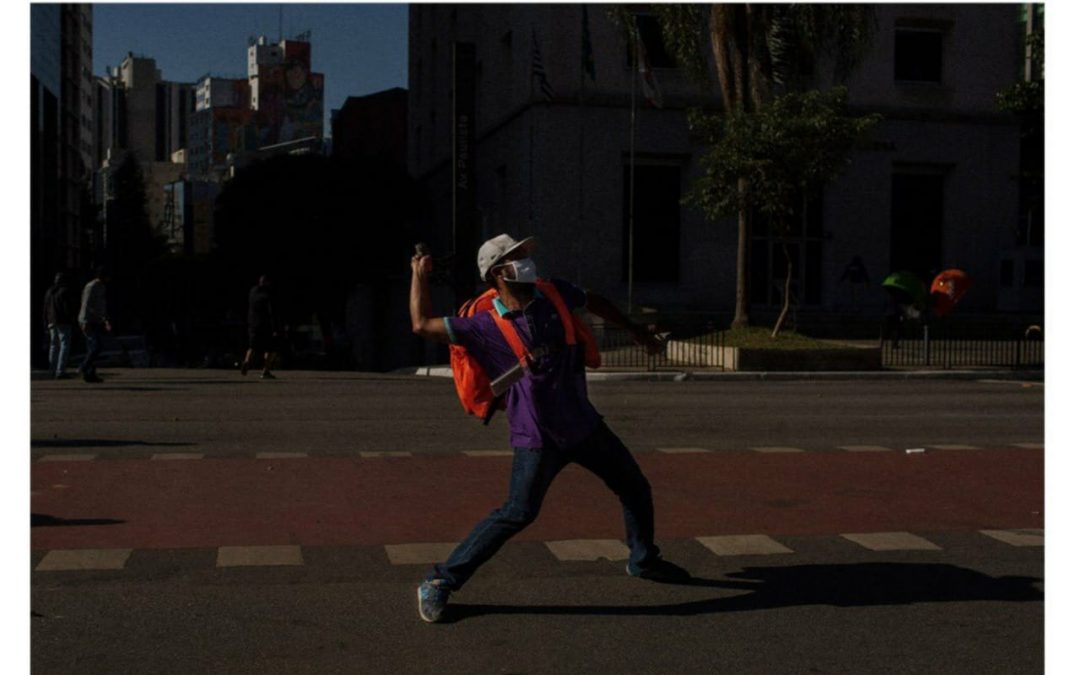Image: Rafael Vilela/Mídia Ninja
By Felipe Milanez and Samuel Vida
Tragedies are always socially unequal and expose in a striking way historically constructed inequalities, for example in the degree of exposure to risks and the way vulnerabilities are shaped. The new Sars-CoV-2 coronavirus is a non-human agent from a zoonosis that infects people and causes respiratory infections; it was not produced by humans in laboratories, as some conspiracy theories have speculated. It is a new virus that circulates among humans and has spread quickly to all continents. However, exposure to the virus and the treatment of its effects among human populations have been distributed extremely unevenly. While some people have had privileged access to medical care, equipment to ensure the ability to breathe and supply oxygen, other social groups disproportionately bear the negative effects, in a pattern structured by social classifications. This unequal distribution can be manipulated to control lives and how much different social groups are exposed to death, in a typical necropolitical exercise (Mbembe, 2018, 2020).
Among the acts that characterize the crime of genocide, according to the UN Convention of 1948, is that of “intentional submission of the group to conditions of existence that cause total or partial physical destruction”. The new UN Special Rapporteur on the rights of Indigenous peoples, José Francisco Cali Tzay, of the Maya Kaqchikel people of Guatemala, whose former president Efraín Ríos Montt was convicted of genocide, has had a great deal of experience in fighting against racism in his country. In his first official statement in his new position, he stressed that “Covid-19 is devastating the world’s Indigenous communities and it is not just a matter of health”. In Brazil, Abdias Nascimento (1978) was a pioneer in unmasking the direct link between racism and Black genocide, which the current crisis is not only revealing but also intensifying – and now involving Indigenous people too. The National Truth Commission recognized the responsibility for the death of 8,350 Indigenous people by the State, the destruction of Indigenous lands and violations of rights “by direct action or omission”. The crime of genocide is not defined by the number of people killed, nor by the explicit manifestation of a genocidal motive, but by the acts of commission or omission undertaken and their objective effects. One or a few deaths produced as part of a process of exterminating a group affects the whole existential dynamics of the group, directly and indirectly, damaging its autonomy, weakening its political leadership and its strategies of cultural resistance, and contributing to the disintegration of its identity and its physical disappearance.
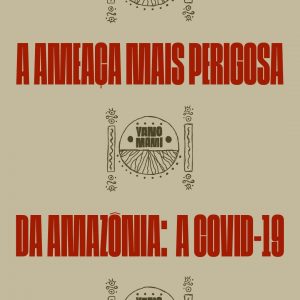
In the case of Brazil, even before the video of the ministerial meeting on 22 April was released, the political use of the coronavirus as an element to produce the death of specific and racially defined social groups was assuming the dimensions of genocide. It was not necessary to see the Minister of Education embracing a fascist ideology – by saying that he hated the “term ‘indigenous peoples’ [and] ‘Roma people’”, because there was only one Brazilian nation, “whether black or white” or “descendant of Indians”, and it was necessary to “end this trading of ethnic identities and privileges” – to understand how the pandemic has intensified a fascist policy that works through extermination. There are already more than 34,000 deaths, and they have not been randomly distributed among the more than 614,000 cases of infection in the second most affected country in the world. In a society historically structured by socio-racial disparities that cross differences of social class, defining different degrees of recognition and access to basic social, civil and political rights, the primary victims of this genocide are, fundamentally, Black communities, both urban (favelas, invasion settlements, tenements, occupations, etc.) and rural (quilombos, subsistence communities and other traditional forms of land occupation), and the diverse ethnic groups of originary peoples, generally called Indigenous peoples, who also live in urban contexts and in rural and forest areas.
This is a genocide related both to ethnic purification and also to economic interests in the exploitation of land and bodies – whether those of Black workers subjected to a regime of overexposure to the risks of contagion by continuing to do domestic work in the homes of white families; of Black workers in the informal job market; of Indigenous and Black workers in agribusiness; or of Indigenous and quilombola communities robbed of their lands by policies, approved in the midst of the pandemic, that aim to legalize mining and land grabbing. Frantz Fanon identified the perfect correlation between economics and ideology in a racist society: “The racist in a culture with racism is therefore normal. He has achieved a perfect harmony of economic relations and ideology” (2018, p. 86). And, in the case of Bolsonaro and a government that has already openly taken inspiration from the Nazi regime, eugenics is an additional factor in the deadly exposure to infection of elderly, sick and marginalized people. At the same ministerial meeting, Paulo Guedes, Minister of Economy, and Ricardo Salles, Minister of Environment, demonstrated how the ideology of Bolsonarism aligned with economic interests by means of the implementation of fascist politics, as Fanon had observed: the moment of “tranquillity” created by the genocide offered an “opportunity” for expansion of profit, mining, new lands for an agribusiness that works with slave-like conditions, in addition to having placed a “grenade” in the pocket of the working class.
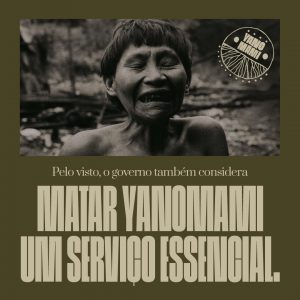
In Brazil, the institutional racism (Carmichael and Hamilton, 1967) that pervades state structures and policies is a continuation of colonialism – racism, colonialism and conquest are inseparable terms, as noted by Aimé Césaire (1978) and Frantz Fanon (2005). The flexibility of the racist practices that have existed throughout the history of Brazil’s social and institutional formation today enables a vigorous re-elaboration and adaptation to the new conjuncture emerging with the coronavirus pandemic. The narcissistic pact of whiteness (Bento, 2002) legitimates racist policies, silencing a large part of the self-declared progressive sectors, including their political parties and the institutions representing civil society, which are subject to the hegemony of white sectors that are the historical beneficiaries of policies that racially exclude Black and Indigenous peoples, and of the unequal appropriation of material and symbolic resources and access to political and legal structures. Cida Bento identified these intergroup alliances among whites as involving a “pact”, which he calls narcissistic because it constructs an image of Black people laden with negativity, inventing an inferior other that threatens the superiority of the white. This denial avoids the issue of how racial privileges are maintained; it evades the fear of loss. This silencing promotes the exclusion of Blacks and Indians from spaces of power and from spaces of life, such as being able to access mechanical respirators.
During these two months of the pandemic in Brazil, in addition to the overt and criminal political choices made by the federal government to play down the risks posed by the pandemic and hinder the establishment of a common strategy coordinated jointly with States and Municipalities, it is clear that, even in the policies and efforts undertaken by state and municipal governments, resources, measures and speeches are typically aimed at the white segments of the urban and rural upper and middle classes. And when this is not enough, the white elite board a private plane to access special treatment in a hospital for whites in São Paulo, the centre of Brazilian capitalism.
In short, the policies to combat the pandemic are centred on a supposedly universal principle that, in the end, takes as a standard the circumstances and the resources of the white segments of Brazilian society. Thus, the main guidelines and measures, such as the intensification of hygiene through the use of sanitizing gel, water and soap, adherence to social isolation, working from home, the suspension of school activities and parts of public services and non-essential economic activities, in addition to other practices of social distancing, are only possible for the white portions of Brazilian society.
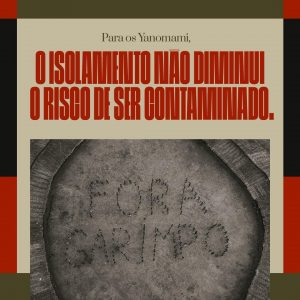
There are no specific policies for Black and Indigenous communities, which would take account of their historical material deprivation, their concentration in precarious employment sectors such as service work, informal markets and rural activities linked to food production and agribusiness, the specificities of their community-based social conditions, especially in terms of their concentration in precarious housing, with high demographic densities and lacking basic infrastructure, their difficulty in accessing basic items for the prescribed hygiene regimes, as well as their sociocultural singularities. In the face of this criminal omission, accumulating data are confirming a higher mortality rate among these groups, who are effectively being left to die.
If the new coronavirus is an epidemiological novelty for the human species and there is no immunity from previous contacts, such as old epidemics that originated in Asia, Africa or Europe and were transported to the Americas, then all humans are equally vulnerable. But some die more than the others. There is no genetic factor that explains why in Brazil Blacks die five times more than whites from Covid-19, or why the infection rate is higher among Indigenous people – up to 744% – than among whites. The difference is in the wall: which side the Indigenous and Black people are on, and which side the whites are on. And the way this wall is expanding in Brazil is structured by environmental racism (Bullard and Wright, 2009), directing risk towards racially inferior populations, as seen for example in the locating of a hotel for social isolation in a Tupinambá territory in Bahia, or in the irresponsible police repossessions that occurred in São Paulo, which displaced 50 families, or the criminal decision by the federal government to evict 800 quilombola families as part of the development of the Alcântara Space Base in Maranhão.
Even with the alarming increase in mortality among historically vulnerable racial groups, various state governments are beginning to outline a cynical discourse of responsibility, referring to victims’ supposed “lack of discipline” and insistence on violating the rules of isolating and social distancing, while at the same time the governments encourage measures that intensify the police repression, criminalization and oppression of these groups, prioritizing “lockdown” as the final solution in urban spaces, without considering the elaboration and adoption of other policies appropriate to the specific characteristics of these groups.
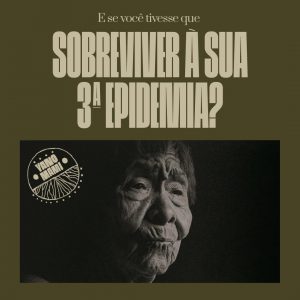
Meanwhile, Indigenous people die and their identity is denied. Even at the time of death, individuals belonging to the originary groups have their identity denied, since, without consultation or against the wishes of their family members, they are classified on the death certificate as “brown” [pardo], even as their leaders call for assistance. Among the Kokama of the Upper Amazonas, for example, the new coronavirus has a “high mortality rate”, greater than that for the white population of Brazil. But their deaths are not on the official list of the Ministry of Health. For this reason, the Indigenous movement, through the Network of Indigenous Peoples of Brazil (Articulação dos Povos Indígenas do Brasil, APIB), started to make its own count of the number of dead and infected people in order to expose the policy of extermination; it also created the National Committee for Indigenous Life and Memory (Comitê Nacional pela Vida e Memória Indígena). The difference between data on deaths collected by the movement and the federal government exceeds 100%: 211 deaths registered by the Committee on June 3, while on the same date the Federal Government counted 60 deaths, ignoring the other 151 Indigenous people who died. These data reveal that the mortality rate for Indigenous people, among whom 67 separate groups have been affected, may be over 16%, compared to approximately 6% of the Brazilian population in general. A similar situation is faced by the National Coordination of the Network of Black Rural Quilombola Communities (Coordenação Nacional de Articulação das Comunidades Negras Rurais Quilombolas, CONAQ), which took the same initiative and started to produce its own epidemiological bulletin in the face of government denial and miscounting. In it, they identified 200 cases and 48 deaths in ten states, and have specifically denounced the ongoing tragic case in Amapá State with respect to quilombola populations and “negligence on the part of local governments”. CONAQ launched their manifesto Vidas Quilombolas Importam. Both coalitions of movements denounce institutional racism and underreporting as a strategy to make extermination invisible, and have produced epidemiological bulletins of their own, independent of the state.
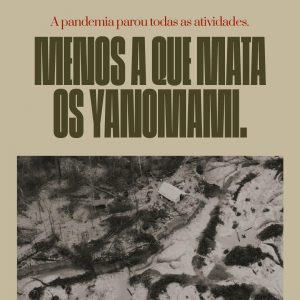
The claim that there is an ongoing genocide in Brazil is not rhetorical. It has been denounced by the Indigenous and Black movements as a “policy of extermination”. Genocide is a process. It is not an “atomic bomb”, dropped on its own. The process of genocide of Indigenous and Black peoples, which is intensifying and becoming more open with the Bolsonaro government, can, with Covid-19, be used as a “final solution” to advance agribusiness and land grabbing on Indigenous lands, as well as to entrench policies that undermine social rights and increase the criminalization and repression of Black urban and rural communities.
In view of the complicit silence produced by the narcissistic pact of whiteness, it is necessary to rediscover the relationship between racism, colonialism and genocide, as the Indigenous leader Juliana Kerexu observes, in order to understand what is happening specifically in Brazil, but also in other situations with similar contexts. It is worth remembering that, historically, all wars of conquest have benefited from epidemics to occupy territories, whether against quilombolas or, mostly, Indigenous peoples. Also, under the pretext of fighting epidemics, ethnic cleansing was implemented in large cities of the African diaspora in the Americas, especially in the early 20th century, deepening the exclusion of Black communities, pushing them into the hills, ghettos and other unprotected places where goods and public services are scarce.
In addition to seeking to mobilize political alliances in Brazilian society and social movements to stop and reverse the current situation, and putting pressure on public authorities to adopt specific policies to manage the pandemic in Black and Indigenous communities, it is also necessary to convince legal institutions, such as the federal and state Public Ministries and the federal and state Public Defender’s Offices, to fulfil their constitutional obligations and act in defence of the general and collective rights of these groups. In this sense, international public opinion can play an important role as a precious ally in the fight against Indigenous and Black genocide in Brazil. Finally, there should also be a joint effort to activate human rights organizations on a regional scale, such as the OAS, and on a global scale, such as the UN, to support the denunciations and hold governments and government officials accountable for the ongoing genocide.
Aimé Césaire showed that a society that turns a blind eye to its most crucial problems is a sick society. The hypocrisy of the colonialist European bourgeoisie produced a Hitler within Europe itself, for they tolerated Nazism when it was practised on others, before becoming victims themselves. Césaire stated that Hitlerism lived within bourgeois humanism, it was its demon; and that Hitler was a crime against the white man, the application in Europe of colonialist processes that had previously oppressed only the colonized. Nobody colonizes with impunity.
If in Brazil today the government encourages the invasion of lands and the killing of Indigenous and quilombola people, as Ailton Krenak said in a recent interview, recalling Césaire and pointing out the diseased society produced by Nazism, then genocide and policies of death are an affront to the life of all Brazilians. The problem, says Krenak, is that “whites continue to pretend they have a civilized country”.
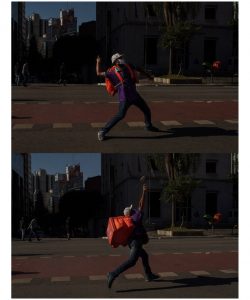
Image: Rafael Vilela/Mídia Ninja
Authors
Felipe Milanez is a Professor at the Institute of Humanities, Arts and Sciences (IHAC) at the Federal University of Bahia. He is a co-investigator of the project Cultures of Anti-Racism in Latin America at the University of Manchester, as well as coordinator of the CLACSO Working Group on Political Ecology(ies) from el Sur/Abya Yala. He was editor of National Geographic Brasil magazine and Brasil Indígena magazine (FUNAI), and is the author of Memórias Sertanistas (Ed. Sesc) and Guerras da Conquista (Harper Collins). He holds a PhD in Sociology from the University of Coimbra.
Samuel Vida is a Ogã de Xangô of the Terreiro do Cobre, Salvador, Bahia. Militant of the Black Movement. PhD student in Law, State and Constitution, UNB. Professor of Law at the Federal University of Bahia. Coordinator of the Law and Race Relations Program (PDRR/UFBA). Executive Secretary of the Afro-Cabinet for Institutional and Legal Articulation (Afro-Gabinete de Articulação Institucional e Jurídica, AGANJU). He served as a consultant to the UNDP/UN and the Chamber of Deputies in the drafting of the Racial Equality Statute. He coordinated the Na Fé e Na Raça campaign.
This text was originally published by CLACSO.
Translated from the Portuguese original by Peter Wade
References
Bento, Maria Aparecida Silva. Pactos narcísicos no racismo: branquitude e poder nas organizações empresarias e no poder público. PhD thesis, Instituto de Psicologia, Universidade de São Paulo, 2002.
Bullard, Robert D. and Wright, Beverly (eds.). Race, Place, and Environmental Justice After Hurricane Katrina: Struggles to Reclaim, Rebuild, and Revitalize New Orleans and the Gulf Coast. New York, Hachette Books, 2009.
Carmichael, Stokely and Hamilton, Charles. Black power: the politics of liberation in America. New York, Random House, 1967.
Césaire, Aimé. Discurso sobre o colonialismo. Livraria Sá da Costa, Lisboa, 1978.
Fanon, Frantz. Os Condenados da Terra. Ed. Universidade Federal de Juiz de Fora, 2005.
Fanon, Frantz. “Racismo e Cultura”. Revista Convergência Crítica. Dossiê: Questão ambiental na atualidade, n. 13, 2018. Texto da intervenção de Frantz Fanon no I.° Congresso dos Escritores e Artistas Negros em Paris, em Setembro de 1956. Publicado no número especial de Présence Africaine, de Junho-Novembro de 1956.
Krenak, Ailton. O Amanhã Não está à venda. Cia das Letras, São Paulo, 2002.
Mbembe, Achile. Políticas da Inimizade. Lisboa, Antígona, 2017.
Mbembe, Achile. Necropolítica. São Paulo, N-1 Edições, 2018.
Mbembe, Achile. O Direito Universal à respiração. São Paulo, N-1 Edições, 2020.
Nascimento, Abdias. O Genocídio do Negro brasileiro: processo de um racismo mascarado. Rio de Janeiro, Paz e Terra, 1978.

